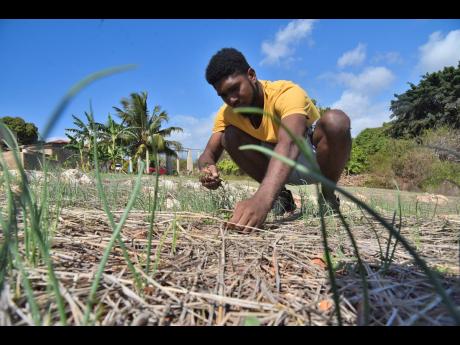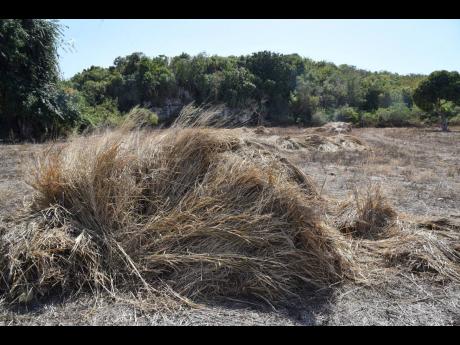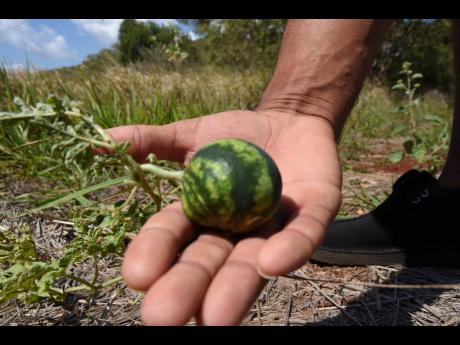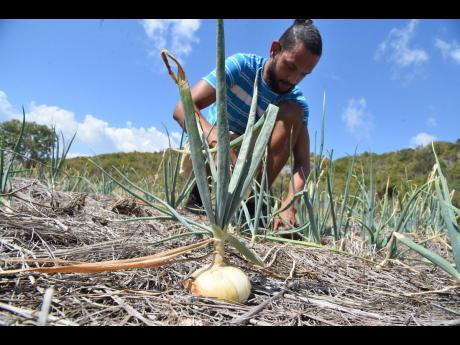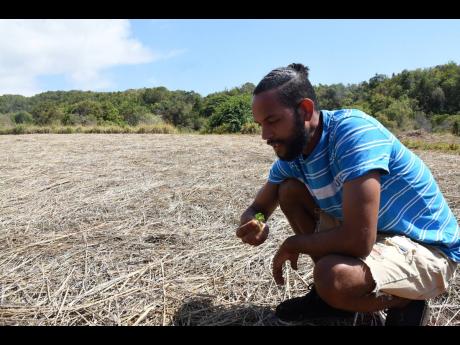Flagaman farmers wilting under water pressure
Several crop farmers in Flagaman, St Elizabeth, are being forced out of business, with many facing bankruptcy as a result of the unavailability of irrigation water and the high cost of trucking water to their farms.
In addition, the rising costs of inputs – seeds, chemicals, fertiliser, as well as labour – have caused distress for many farmers, who traditionally cultivated a mix of onion, bell (sweet) pepper, tomato, and scallion.
On Wednesday, cousins 26-year-old Edgar and 27-year-old Akeem Powell gave The Gleaner insight into the precarious situation facing farmers in the Breadbasket Parish.
“Here in Flagaman, we don’t have any form of irrigation, so we have to source our own water, and a 400-gallon truckload costs about $12,000, and it doesn’t go very far because the time is so dry,” Akeem disclosed.
“And most of the roads are so bad that the farms are accessible only by four-wheel drive vehicles,” he added.
The Powells lamented the high cost for repairs to vehicles damaged while traversing these roadways.
Several plots of land, which had been prepared for planting in the community, remain uncultivated as some farmers await the resolution of the water issue.
The National Water Commission (NWC) is reporting that many of its water-supply systems in several parishes are being impacted by the drought conditions that are now affecting Jamaica.
Edgar explained that whereas Flagaman used to enjoy consistent rainfall in years gone by, the impact of climate change is beginning to be felt in the southwestern St Elizabeth community, with the strong, dry winds, which have now become a daily feature, speeding up the rate of transpiration. For this reason, farmers are forced to water their crops more often.
Edgar also noted that the situation has also caused an increase in the frequency of brush fires.
Having to pay a minimum of $3,500 a day for labour to weed the onion plots is also adding pressure for the farmers.
This, according to the Powells, means pulling up the weeds so roots do not entangle and strangle the emerging bulbs.
Akeem showed The Gleaner a 1.2-acre plot, where they had already spent $300,000, with the projection of harvesting at least 100 fifty-pound bags of onions.
“At $10,000 a bag, that would give you $1 million, but because the growth of the crop has been stymied [as a result of the water crisis], by the time we get this crop to maturity, it will cost us another $500,00, and that is if we don’t face any threats from beet armyworm or other pests and diseases, which would mean investing in chemicals to take care of them,” he said.
The cousins said that having been born and raised in farming and have no other practical alternative for work. However, they could be forced to seek employment out of the area or the sector if things do not improve.
“Some man who a did big farmer end up affi a work fi people now pon day work,” Akeem disclosed, admitting that they have had to find a side hustle to survive the lean periods. “You buy goods sometimes and try to sell it at a profit to keep your farm going. Farming is like a dying culture in this country right now.”
He added: “Farming is very discouraging and has reached a level where most man a pull out ... . Is like the war inna Ukraine. Is like a prolonged war with ... water right now.”

